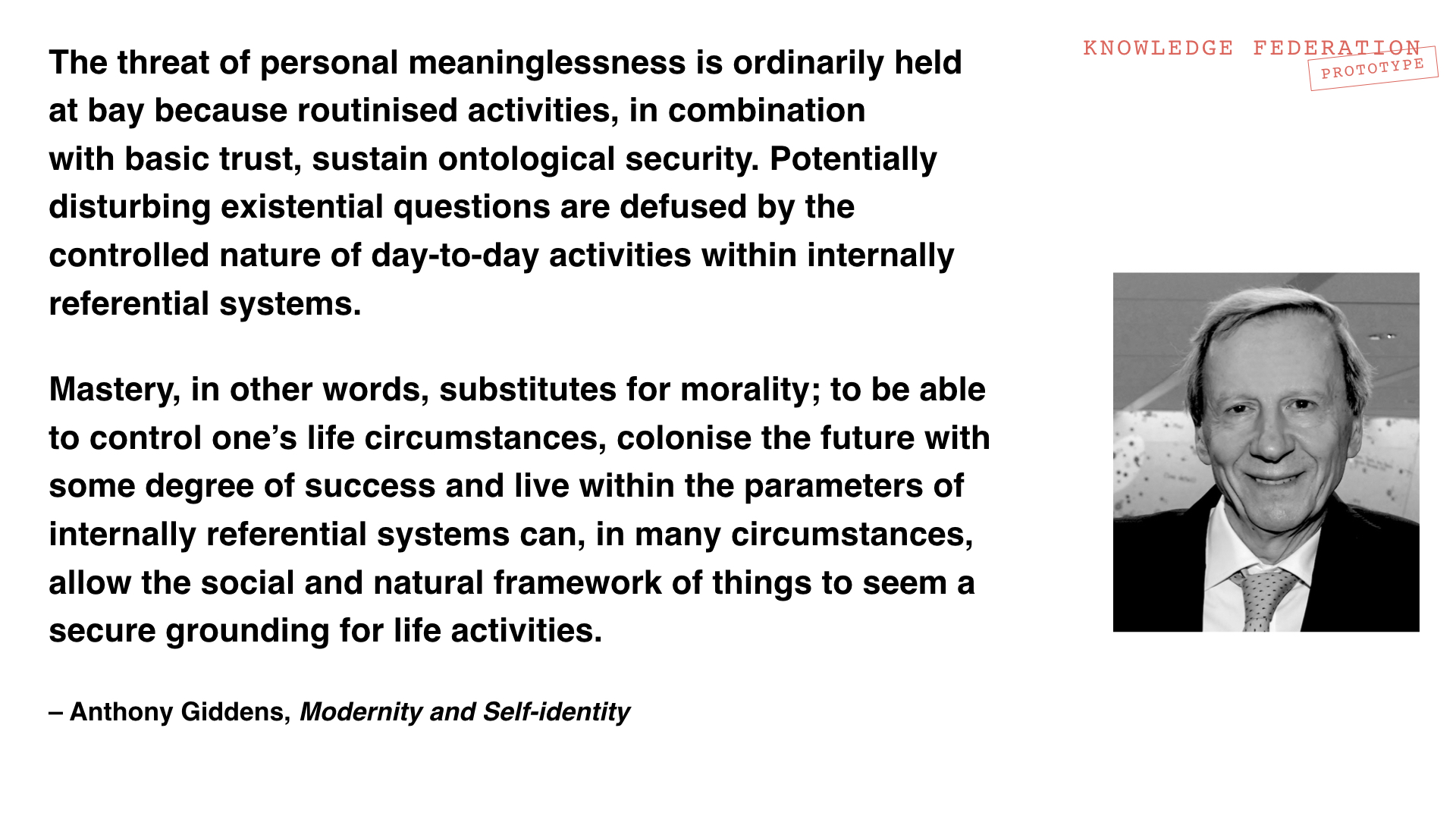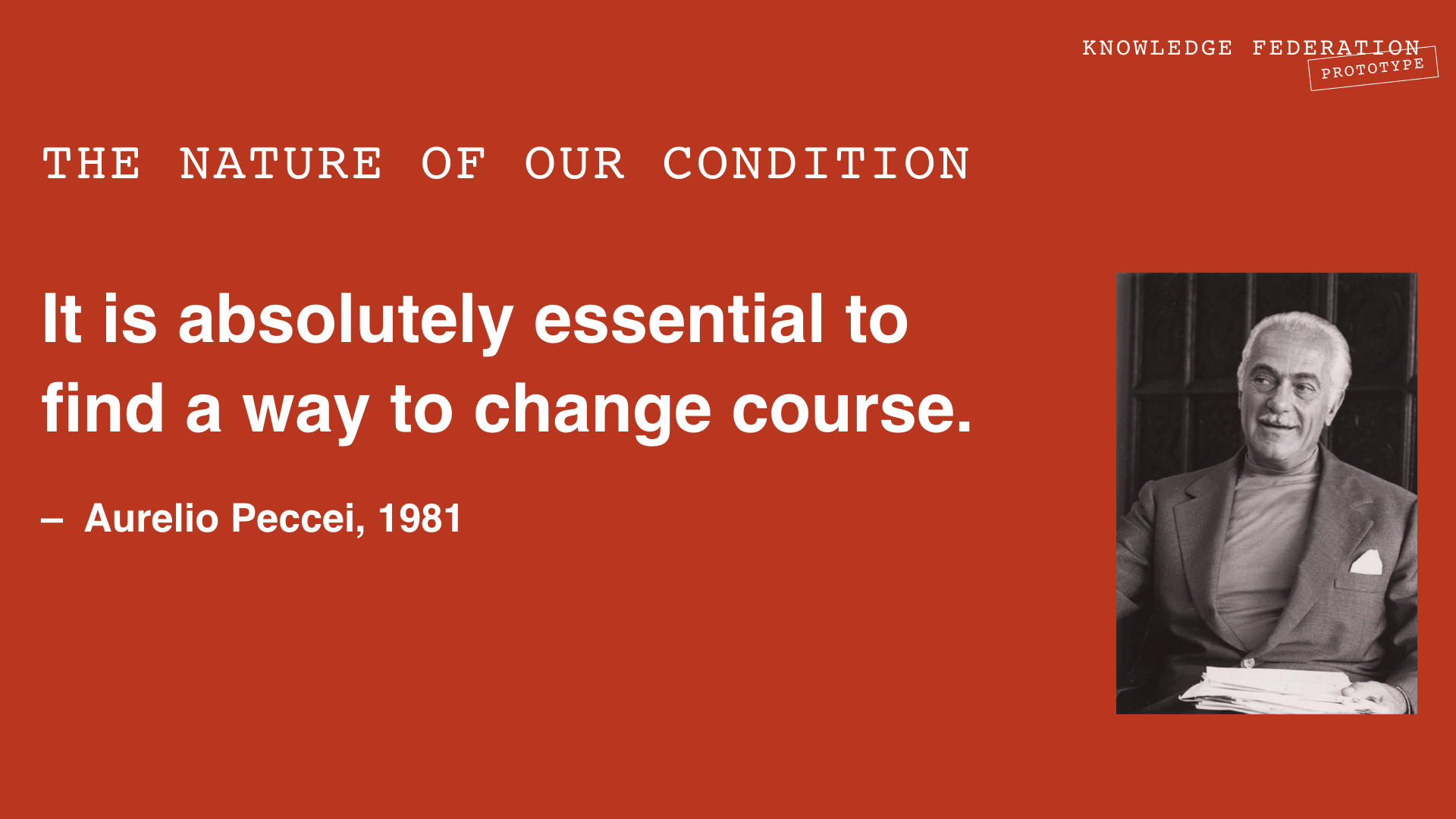Difference between revisions of "Holotopia"
m |
m |
||
| Line 22: | Line 22: | ||
<div class="col-md-7"> | <div class="col-md-7"> | ||
[[File:Giddens-OS.jpeg]] | [[File:Giddens-OS.jpeg]] | ||
| − | <p>In the world where we've all been socialized to "mind our own business" and just <em>publish more</em>, as scientists, and as journalists (because that's what we are paid for, and what our careers and the prestige and the livelihood of our institutions depend on)—we have no incentive, no | + | <p>In the world where we've all been socialized to "mind our own business" and just <em>publish more</em>, as scientists, and as journalists (because that's what we are paid for, and what our careers and the prestige and the livelihood of our institutions depend on)—we have no incentive, no institution, no established method, and no <em>willpower</em> to make the kind of changes that would put information and knowledge into the service of the creation of meaning— which our society now most vitally needs.</p> |
<p>A goal of the Holotopia <em>prototype</em>, which is currently in development, is to overcome that obstacle.</p> | <p>A goal of the Holotopia <em>prototype</em>, which is currently in development, is to overcome that obstacle.</p> | ||
<p>What would our world be like, if we elevated the most vital insights from the "information jungle", and combined them together to give us vision? How would our world be different, if the best ideas of our best minds were reflected in the way we comprehend things—and if we also <em>acted</em> accordingly?</p> | <p>What would our world be like, if we elevated the most vital insights from the "information jungle", and combined them together to give us vision? How would our world be different, if the best ideas of our best minds were reflected in the way we comprehend things—and if we also <em>acted</em> accordingly?</p> | ||
Revision as of 05:26, 23 March 2020
Contents
Holotopia
We have lost the sense of direction
Already in the 1990, when Tim Berners Lee was still only writing the code for the World Wide Web, the NYU communications scholar Neil Postman was warning us that our habitual massive outpouring of information tends to have the opposite effect from the one intended—that it not only leaves us uninformed, but that it damages our sense of meaning, our very ability to make sense.
Imagine a world where information is treated as we treat other human-made things—where information is tailored to the core purposes that need to be served. What would information be like in such a world? By what methods, in what ways and by whom would it be created? What new information formats, new kinds of information would emerge? How would the information technology be used? In what way would our public informing be different? What would academic communication, and our education, be like? By creating the Knowledge Federation prototype, we provided a thorough and academically coherent answer to those and other related questions—answers that are not only described and explained, but also implemented, as real-life embedded prototypes.
But having done that, we are compelled to concede that we are still facing the same challenge that the visionary thinkers whose insights we wove together to create Knowledge Federation were unable to overcome.
We seem unable to make a change
In the world where we've all been socialized to "mind our own business" and just publish more, as scientists, and as journalists (because that's what we are paid for, and what our careers and the prestige and the livelihood of our institutions depend on)—we have no incentive, no institution, no established method, and no willpower to make the kind of changes that would put information and knowledge into the service of the creation of meaning— which our society now most vitally needs.
A goal of the Holotopia prototype, which is currently in development, is to overcome that obstacle.
What would our world be like, if we elevated the most vital insights from the "information jungle", and combined them together to give us vision? How would our world be different, if the best ideas of our best minds were reflected in the way we comprehend things—and if we also acted accordingly?
The purpose of Holotopia is to not only answer those questions by providing a clear vision of such a world—but to also empower us to begin to create it.
What would it take to change course?
Based on a decade of The Club of Rome's research into the future prospects of mankind, Aurelio Peccei diagnosed that the humanity is on a collision course with nature. We take his diagnoses as a challenge, and as a natural benchmark test for our project. Can the new 'headlights' we are proposing help us "change course"? And if they can—what will the new course be?




